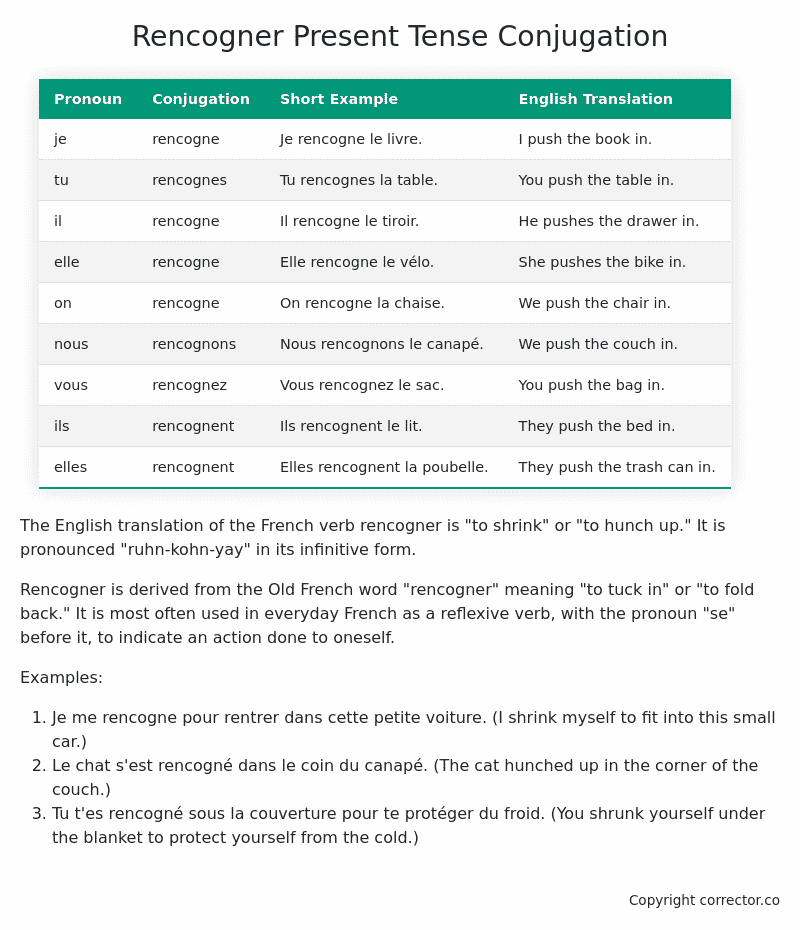Le Present (Present Tense) Conjugation of the French Verb rencogner
Introduction to the verb rencogner
The English translation of the French verb rencogner is “to shrink” or “to hunch up.” It is pronounced “ruhn-kohn-yay” in its infinitive form.
Rencogner is derived from the Old French word “rencogner” meaning “to tuck in” or “to fold back.” It is most often used in everyday French as a reflexive verb, with the pronoun “se” before it, to indicate an action done to oneself.
Examples:
- Je me rencogne pour rentrer dans cette petite voiture. (I shrink myself to fit into this small car.)
- Le chat s’est rencogné dans le coin du canapé. (The cat hunched up in the corner of the couch.)
- Tu t’es rencogné sous la couverture pour te protéger du froid. (You shrunk yourself under the blanket to protect yourself from the cold.)
Rencogner – About the French Present Tense
To take a deep dive into all the French tenses then see our article on Mastering French Tense Conjugation.
Common Everyday Usage Patterns For Le Present
Interactions with Other Tenses
Table of the Present Tense Conjugation of rencogner
| Pronoun | Conjugation | Short Example | English Translation |
|---|---|---|---|
| je | rencogne | Je rencogne le livre. | I push the book in. |
| tu | rencognes | Tu rencognes la table. | You push the table in. |
| il | rencogne | Il rencogne le tiroir. | He pushes the drawer in. |
| elle | rencogne | Elle rencogne le vélo. | She pushes the bike in. |
| on | rencogne | On rencogne la chaise. | We push the chair in. |
| nous | rencognons | Nous rencognons le canapé. | We push the couch in. |
| vous | rencognez | Vous rencognez le sac. | You push the bag in. |
| ils | rencognent | Ils rencognent le lit. | They push the bed in. |
| elles | rencognent | Elles rencognent la poubelle. | They push the trash can in. |
Other Conjugations for Rencogner.
Le Present (Present Tense) Conjugation of the French Verb rencogner (this article)
Imparfait (Imperfect) Tense Conjugation of the French Verb rencogner
Passé Simple (Simple Past) Tense Conjugation of the French Verb rencogner
Passé Composé (Present Perfect) Tense Conjugation of the French Verb rencogner
Futur Simple (Simple Future) Tense Conjugation of the French Verb rencogner
Futur Proche (Near Future) Tense Conjugation of the French Verb rencogner
Plus-que-parfait (Pluperfect) Tense Conjugation of the French Verb rencogner
Passé Antérieur (Past Anterior) Tense Conjugation of the French Verb rencogner
Futur Antérieur (Future Anterior) Tense Conjugation of the French Verb rencogner
Subjonctif Présent (Subjunctive Present) Tense Conjugation of the French Verb rencogner
Subjonctif Passé (Subjunctive Past) Tense Conjugation of the French Verb rencogner
Subjonctif Imparfait (Subjunctive Imperfect) Tense Conjugation of the French Verb rencogner
Subjonctif Plus-que-parfait (Subjunctive Pluperfect) Tense Conjugation of the French Verb rencogner
Conditionnel Présent (Conditional Present) Tense Conjugation of the French Verb rencogner
Conditionnel Passé (Conditional Past) Tense Conjugation of the French Verb rencogner
L’impératif Présent (Imperative Present) Tense Conjugation of the French Verb rencogner
L’infinitif Présent (Infinitive Present) Tense Conjugation of the French Verb rencogner
Struggling with French verbs or the language in general? Why not use our free French Grammar Checker – no registration required!
Get a FREE Download Study Sheet of this Conjugation 🔥
Simply right click the image below, click “save image” and get your free reference for the rencogner Present Tense tense conjugation!

I hope you enjoyed this article on the verb rencogner. Still in a learning mood? Check out another TOTALLY random French verb present conjugation!


